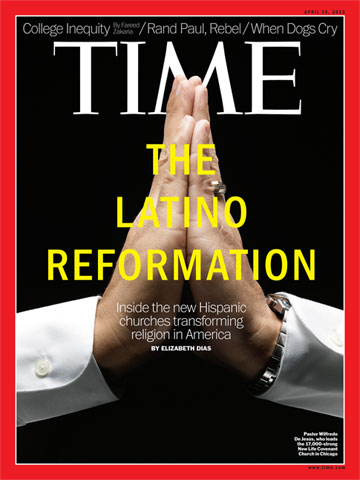
(5 of 7)
After he took over New Life from his father-in-law in 2000, Choco bought a farm outside the city and converted it into a home for recovering drug addicts and prostitutes. Then he purchased a liquor store near the church and turned it into a café to reduce loitering and crime in the neighborhood. He recalls, "We started doing English services to reach third-generation Hispanics, who love their culture, who love their rice and beans, but prefer to hear a sermon in English. I started doing that, and the church started growing."
New Life didn't just grow--it exploded. Choco leased nearby Roberto Clemente High School for Sunday use and later transformed his original location into a new site for a Spanish-language service for first-generation Latinos. Five months later, a second Spanish service was added. He also started to stream services online. Now people tune in from Arizona, Massachusetts, Kentucky and other states. A pastor is available to serve the needs of online congregants.
Soon even the high school became too small, so New Life bought a another property in now gentrifying Humboldt Park last August. There will be 1,000 seats in the main sanctuary, with overflow seating for at least 300 more. (Choco wants the sanctuary's new stage to be able to hold a live elephant and feature harnesses for flying angels--part of his sermons-as-drama series.) At the same time, Choco has branched out, opening a church in Oakwood, which is attracting a largely African-American congregation. Diversity, for New Life, is a recipe for growth. "Latino evangelicals have forced white evangelicals to own their own deepest convictions," explains Grant Wacker, professor of Christian history at Duke Divinity School, "to embrace the neighbor, to embrace the other without regard to social, economic or ethnic distinctions."
The Evangélico Effect
One reason the latino protestant movement is important to watch is that it is largely charismatic. Charismatic connotes a belief in miracles, healing, divine intervention, speaking in tongues and an active spirit world. Its most fervent extremes are enough to give even a devoted believer pause. At El Calvario, a woman was praying so hard that she vomited (or exorcised a demon)--which is not that uncommon: ushers stood prepared with plastic bags to help her. Several others collapsed on the floor in convulsions when they felt God's presence. Sermons aren't drawn from headlines; instead, they often sound like news itself. Eliud Ruiz, El Calvario's pastor, has preached against Russia because, he believes, "Russia is going to lead the Islamic republics against Israel. It's in the Bible."
Then there are the miracles, which can seem almost commonplace in Hispanic churches. An El Calvario woman waved two medical reports--one from when she was diagnosed with osteoporosis, another from the day doctors said it had disappeared. A restaurant cook testifies that God stopped her 12 years of migraines after she fasted with the church for three days, and another woman says her internal bleeding stopped when the pastor poured oil on her forehead and the people prayed.
